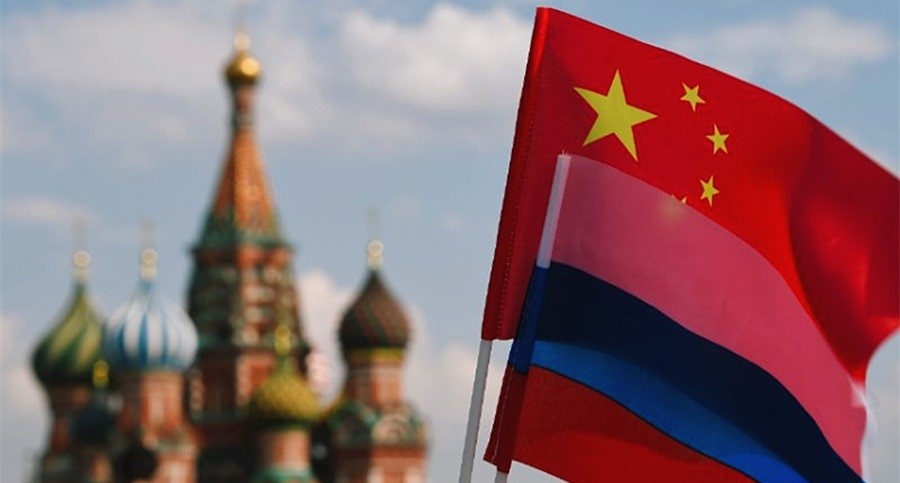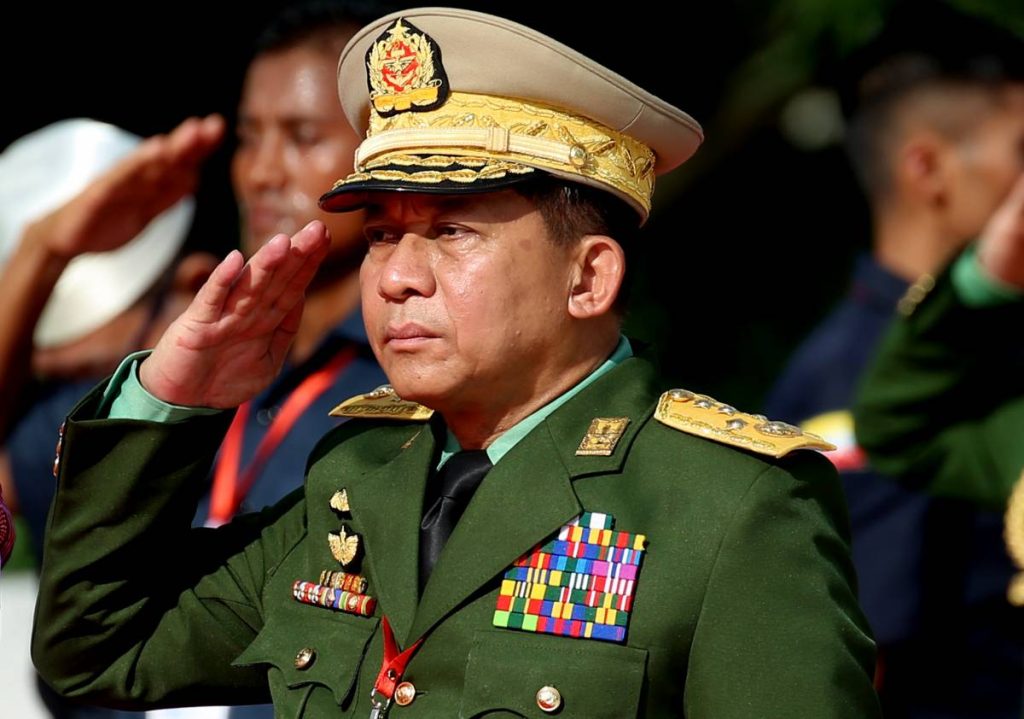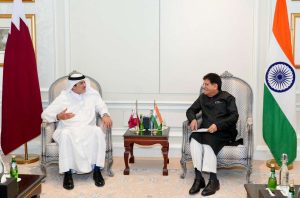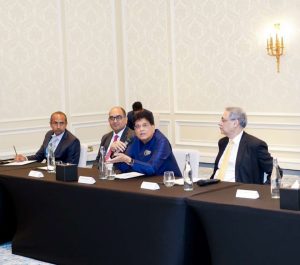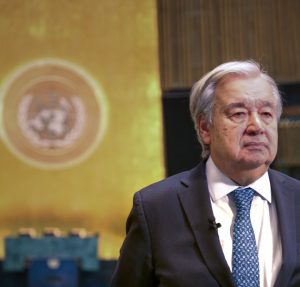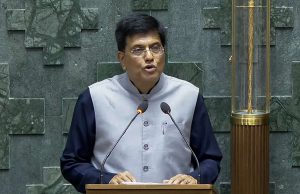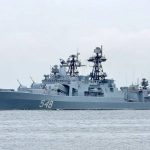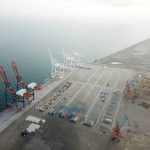There is now a concerted message from US government officials alleging that China is largely responsible for the build-up in Russia’s defence industry. As one example, Moscow is now able to produce three times the artillery ammunition that the USA and Europe combined can….reports Asian Lite News
China insists it “has always maintained an objective and impartial position” on Russia’s invasion of Ukraine. Yet, contrary to these words of assurance, China is aiding and abetting Russia’s war of aggression against the Ukrainian people.
The rhetoric from China is sharply at odds with its actions. A Chinese Foreign Ministry spokesman claimed last year that “As for military item exports, China has throughout adopted a prudent and responsible attitude”. However, such statements are laughable in the face of mounting evidence that says otherwise.
As violence flares in the Middle East, exacerbated by Iran’s barrage against Israel, some are naively suggesting that China should help mediate there too. As J. Michael Cole, Senior Advisor, Countering Foreign Authoritarian Influence at the Washington DC-based International Republican Institute, commented: “That sure hasn’t worked with Russia over its war of aggression against Ukraine. Nor did it work with North Korea. When will the world stop living under the illusion that Beijing will be a partner for peace?”
Disclosing previously classified intelligence, senior US officials have claimed that China is helping bankroll Russia’s resurgent military-industrial complex. After starting cautiously after Vladimir Putin’s invasion, China has been gradually ramping up clandestine support for Russia. It is helping plug gaps by rebuilding Russia’s defence industrial base. Indeed, there is alarm that Russia is now achieving its most massive military-industrial expansion since the end of the Cold War. For instance, General Chris Cavoli, commander of the US European Command, recently testified that Russia has been “quite successful” at reconstituting its military.
Indeed, its capacity has largely “grown back” to what it was pre-invasion despite Western sanctions. President Joe Biden raised precisely this issue with Chairman Xi Jinping in a phone call on 2 April. According to a US readout of the conversation, Biden “raised concerns over the People’s Republic of China’s [PRC] support for Russia’s defence industrial base and its impact on European and transatlantic security”.
There is now a concerted message from US government officials alleging that China is largely responsible for this build-up in Russia’s defence industry. As one example, Moscow is now able to produce three times the artillery ammunition that the USA and Europe combined can.
Last week, US officials divulged some of the ways that China is lending support. For instance, Chinese and Russian groups are working to jointly produce drones inside Russia. They also mentioned cruise missile and drone engines, as well as machine tools that are needed to manufacture ballistic missiles. Moscow used to get its machine tools from Europe, but sanctions turned off that conduit. Regardless, it has found alternative and willing suppliers, and nearly 70 per cent of Russia’s USD 900 million worth of machine tool imports in the last quarter of 2023 emanated from China.
The USA has complained that Dalian Machine Tool Group has provided tooling to Russia. Other guilty parties for items used in military equipment include Wuhan Global Sensor Technology, Wuhan Tongsheng Technology and Hikvision, which are providing optical components that can be used on armored vehicles, for instance. iRay Technology and the North China Research Institute of Electro-Optics have also supplied military optics.
Electronic components are flowing Russia-ward from China too. Where Western companies have stopped supplying items like semiconductors, China has stepped in to fill the gap. Hong Kong, for instance, is a vital conduit of computer chips to Russia. So much so, that China supplied 90 per cent of computer chips imported by Russia last year. These are critical for things such as targeting systems and radars. Additionally, Russian semiconductor imports from China soared from USD200 million in 2021 to more than USD500 million in 2022.
Chinese entities are also helping boost Russia’s satellite and other space-based capabilities. Media have reported that China has supplied Russia with propellant for use in missiles, nitrocellulose (used to make gunpowder for artillery rounds, for example), avionics and fighter jet engine parts too. Another widely reported export from China to Russia is drones and associated spare parts.
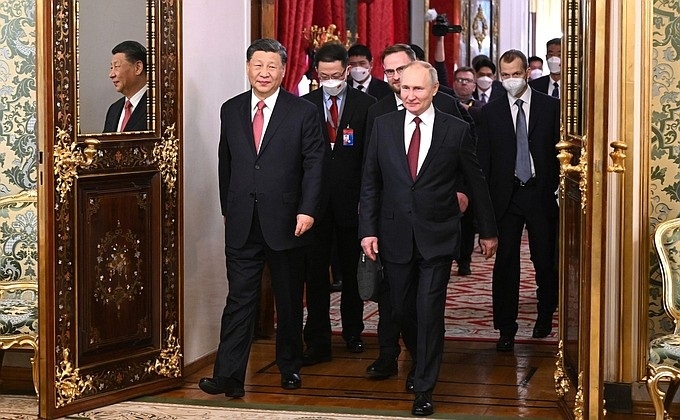
Molfar, a Ukrainian business intelligence consultancy, has reported that devices from DJI – the world’s largest maker of consumer market drones – continue to flood into Russia, despite DJI’s promise in 2022 to stop doing business there. Molfar alleged that low-cost DJI drones are being sold to Russian companies such as Skymec, SHUBBA-Octagon and Pustelga to train government and military personnel on how to fly drones. These are not lethal weapons, but they are militarily useful to Russia.
Molfar also reported that Chinese companies sent USD200,000 in drone shipments to Ukraine in the first half of 2023, compared to at least USD14.5 million to Russia in the same period. The London-based Royal United Services Institute estimates that Ukraine goes through something like 10,000 drones a month. Other Russian imports from its eastern friend include trench-digging equipment and unusually high numbers of tractors. Chinese ball-bearing exports have surged to countries like Kyrgyzstan, which then find their way onto Russian tanks.
A year ago, a senior adviser in Ukrainian President Volodymyr Zelenskyy’s office told Reuters that in “weapons recovered from the battlefield, we continue to find different electronics. The trend is now that there are fewer Western-made components but more- not hard to guess which country – components. Of course, China.” They have been found in navigation systems in Russian Orlan drones, for instance. Or instead of French-made fire control system components in Russian tanks, they now feature Chinese parts.
The Ukrainian official also listed Norinco and Xinxing Guangzhou Import & Export Co as suppliers to Russia’s military. Ukraine has imposed sanctions against Comnav Technology for supplying navigation and radar equipment to Russia, but it is just one of 14 Chinese companies sanctioned by Ukraine so far.
There is no hard evidence that China has provided Russia with lethal aid like missiles, munitions or weapons. The same cannot be said of North Korea and Iran, of course, which are actively supplying Russia with missiles and loitering munitions. However, China is providing copious amounts of “dual-use” items used by Russia’s industrial-military complex to produce weapons for use against Ukraine. By doing so, Beijing is supporting Russian aggression and prolonging the war.
In one of the clearest allegations yet, David O’Sullivan, who is International Special Envoy for the Implementation of EU Sanctions, claimed last September that up to 70 per cent of sensitive, high-tech products used to kill Ukrainians are reaching Russia’s military via China. O’Sullivan asked, “Now we need to understand better exactly what that means. How much of this is actually produced by China copying our technology, how much of it is produced in China but with Western technology, and how much is coming directly from other sources and then re-exported via China.”
Speaking of components like microchips, integrated circuits, optical readers and flash memory cards, the EU sanctions leader pointed out: “…Once they go to Russia, we know they’re not going into consumer goods or innocent activities. They will go straight to the military-industrial complex and produce weapons that are more lethal and more deadly.”
China approaches, but attempts not to blatantly overstep, the red lines painted by the West right after Putin invaded Ukraine. China has been cautious in its support for Putin, as shown in the wake of the original invasion and the rebellion of Wagner’s head Yevgeny Prigozhin in mid-2023. However, Xi remains in close communication with his Russian comrade, and has personally met him several times since the outbreak of war, as well as multiple telephone calls. In the same timeframe, Xi managed just one phone call with Ukrainian President Volodymyr Zelenskyy.
Indeed, Xi’s government still cannot bear to call Russia’s action an invasion or war. When Putin met Xi in March, it was educational that more than half his team attending were officials involved in Russian weapon and space programs. Since the Ukraine war broke out, the People’s Liberation Army (PLA) has actually increased its joint training activities with Russia.
China has bolstered Russia in other ways too. Xi and his officials diplomatically blame the West for provoking Putin into launching this “operation”. Xi also foisted a comprehensive propaganda campaign on Chinese educators, whereby an official narrative supporting Russia’s reasons for invading Ukraine were promulgated nationwide. Bilateral trade has reached record levels too, worth USD240 billion last year. Revenue achieved by Russia can be funneled to fund Moscow’s war effort, and Beijing has also forged closer relations with Iran, who is a key Russian ally not shy about directly supplying weapons to Moscow.
Xinhua reported this month that Sino-Russian ties are at the “highest historical level of comprehensive strategic partnership for a new era”. Significantly, there is an effort to deepen institutional links between the two countries, rather than rely on just the respective leaders’ personal friendship.
There are occasional but prominent Chinese voices that express opposition to Russia’s war. As an example, Feng Yujun, deputy dean of Fudan University’s Institute of International Studies, argued that the war “as a strategic opportunity for China would be wrong”. Not everyone is enamored with Xi’s direction, and some intellectual elite have expressed their private opposition. Nonetheless, Arran Hope, writing for The Jamestown Foundation, concluded: “Xi
Jinping is unlikely to be persuaded by any of the arguments presented by dissenting voices. Cracks that exist in the Sino-Russian relationship are minimal next to the overwhelming support with which the PRC buttresses the Russian war machine.
Many PRC experts refer to the conflict as a ‘proxy war’ or ‘avatar war’, referring to US and Western support for Ukraine. But the level of PRC support for Russia suggests that the PRC is every bit as involved on the other side of the conflict.”
During a trip to Beijing in early April, US Treasury Secretary Janet Yellen warned Chinese companies about providing support for Russian violence. She told reporters: “We continue to be concerned about the role that any firms, including those in the PRC, are playing in Russia’s military procurement. I stressed that companies, including those in the PRC, must not provide material support for Russia’s war and that they will face significant consequences if they do. And I reinforced that any banks that facilitate significant transactions that channel military or dual-use goods to Russia’s defence industrial base expose themselves to the risk of US sanctions.”
In recent weeks, Secretary of State Antony Blinken has raised concerns in European capitals about China’s quiet involvement in the war, and he is redoubling efforts to prevent such exports. It is believed that Europe has sanctioned only three Chinese entities since the war broke out, compared to more than 100 by Washington, DC.
The US campaign is understandable, since Beijing does not feel that its relations with Europe have been unduly affected by its latent support for Russia’s war. If Europe does tighten sanctions, this could affect China’s calculus. German Chancellor Olaf Scholz is visiting Xi in Beijing this week, and he is expected to raise this issue. With China slow to emerge from its economic malaise, to which COVID-19 contributed, it is more vulnerable to pressure from Europe. A senior US official said, “One of the most game-changing moves available to us at this time to support Ukraine is to persuade the PRC to stop helping Russia reconstitute its military industrial base. Russia would struggle to sustain its war effort without PRC inputs.”
In complete denial of support for Moscow, but fearing sanctions, the Chinese Embassy in the USA said, “The normal trade between China and Russia should not be interfered [with] or restricted. We urge the US side to refrain from disparaging and scapegoating the normal relationship between China and Russia.” A spokesperson affirmed that China had “not provided weaponry to any party”.
China officially advocates that “the sovereignty and territorial integrity of all countries should be respected”. Yet it has broken its own premise in its dealings with Russia and Ukraine. As Beijing watches all the Western aid going to Ukraine, it perhaps sees its efforts as a necessary counterbalance. It must know, however, that it is treading a very fine line and that there is great risk in providing more tacit support to Moscow. (ANI)
ALSO READ: Apple Shifts Investment to India from China

